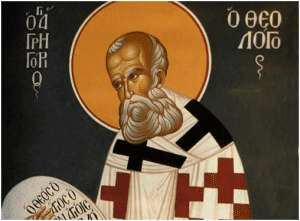St Gregory the Theologian
on the Nativity of our Lord
Like many of the celebrated hymns of the Church, the much-loved Katavasies of Christmas were inspired by the writings of the Fathers of the Church, and in this case, one of the giants of Orthodox Theology in Saint Gregory the Theologian. His 38th Oration on the Nativity of Christ is full of the joy and poetic eloquence we find amongst so much of St Gregory’s work.
Christ is born, glorify Him. Christ from heaven, go out to meet Him. Christ on earth; be exalted. Sing unto the Lord all the whole earth; and that I may join both in one word, Let the heavens rejoice, and let the earth be glad, for Him Who is of heaven and then of earth (Oration 38:1).
St Gregory invites all to celebrate this joyous occasion, but not with the elaborate dances, clothing music, and drunkenness of secular celebrations popular of the time, but with a cleansing of the mind, ears and thoughts so that one can truly reflect on the Divine, and enjoy real delights which will not fade away (Oration 38:5-7).

In reflecting on the event, St Gregory explores the lead up to the event being celebrated: God in His unimaginable love, creates all unseen and seen creation, culminating in the creation of the human being, who is a unique mingling of both realities (Oration 38:7-1). However after the fall, humankind found itself mortal, banished from paradise and distanced from God: a gap that could not be bridged without God’s intervention. So God Himself took on flesh for the sake of our flesh, and mingled Himself with an intelligent soul in order to save our soul. In the words of St Gregory:
O new commingling; O strange conjunction; the Self-Existent comes into being, the Uncreated is created. That which cannot be contained is contained,.. He Who gives riches becomes poor, for He assumes the poverty of my flesh, that I may assume the richness of His Godhead. He that is full empties Himself… What are the riches of His Goodness? What is this mystery that is around me? …He partakes of my flesh that He may both save the image and make the flesh immortal (Oration 38:13).
Source: December 2015 – January 2016 Lychnos Edition
